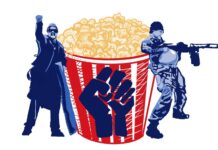Author: Damian Mendieta
Intended to be an inspirational biopic about the man who broke baseball’s color barrier, “42” is instead a more watered-down version of Jackie Robinson’s historical legacy. Starring Harrison Ford as Brooklyn Dodger’s executive Branch Rickey and newcomer Chadwick Boseman as Robinson, the film doesn’t lack acting talent but leaves out some of the most important details about the integration of baseball in 1947.
From the start, a shinning beam of light makes Branch Rickey look like a righteous man out to change the world. While “42” shows the intricate challenges Robinson coped with, the film also makes it seem like baseball integration was made possible only by white men. In the dramatization, Robinson doesn’t think about major league ball until a Dodger’s representative seeks him out. Actually, Robinson had been actively trying out for other major league teams, along with other Negro League superstars.
One of the few things this film does right is the inclusion of black sportswriter Wendell Smith, a reporter who chronicled every hit, out and statement Robinson made. Smith’s opinion was a big factor in the search for a black ballplayer as he advised Rickey to sign Robinson (also not shown in the film). The savvy journalist provided support to Robinson as he endured brutal racism.
Yet the film does not include another big player in the breaking of the color barrier. Robinson was not the only Black man to play on the diamond in 1947. Larry Doby (a 7-time all-star and hall-of-famer) put on the Cleveland Indians uniform during the same season. The two frequently talked on the phone during their historical year, but Doby was nowhere to be seen in “42.”
The integration of major league baseball was not as swift and smooth like a fastball. The players did not only endure racism that was embedded into nearly every fabric of society, but their preexisting commitments to other organizations were not honored. Even after Robinson’s stellar career, MLB organizations used unethical means to sign black baseball players. For example, Branch Rickey, among others, declined to pay the purchasing rights of players from the Negro Leagues (also not shown in the film).
“42” put on a show for audiences, but ultimately it was a superficial glimpse into the life of Jackie Robinson. In one scene, Rickey proclaims that people who racially attack Robinson will lead spectators to sympathize with the Dodger’s “noble experiment.” Sympathy is the desire to see someone better off, but empathy, the ability to feel other’s pain, would have been better for Robinson. The raw rejection Robinson often felt was slightly alleviated by heroic gestures from teammates, but earnest dialogue about entrenched racism was absent. Except for a friendly gesture from Pee Wee Reese, Robinson received only fleeting bursts of support from his peers in the film.
The climatic scene of “42” was Jackie’s heroic home run off of a racist pitcher, but the most important moment came earlier when the racist Phillies manager nearly drew Robinson into a brawl. As a hurt Robinson angrily shattered his bat and swore that nobody would ever degrade him again, Rickey told his player that people would only focus on the actions of the black man. Forced to hold back his tongue, Robinson promised to restrain himself for the sake of integrated baseball. Showing how players had to turn the other cheek amidst unbelievable pain allows Jackie Robinson to keep some of his dignity despite the film’s shortcomings.
This article has been archived, for more requests please contact us via the support system.
![]()


































